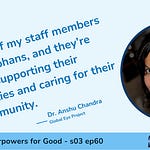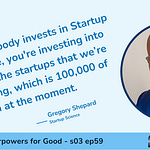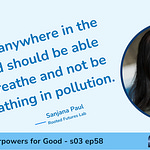Devin: What do you see as your superpower?
Dilla: I sincerely think my ability to connect us all via the past is my superpower.
Shermann “Dilla” Thomas was a member of the delegation invited by the Foreign Ministry to visit Israel last month. I was fortunate to be included in that roster. One of the trip's highlights was getting to know the remarkable, diverse group.
Dilla is rapidly becoming a civic icon and treasure in Chicago. He recently bought a 48-passenger tour bus funded by all the major league teams in town. He’s in discussions to open a South Side micro museum, in separate talks with Thomas Lennon to co-write a script and is blowing up on social media.
It was an honor to visit with him.
AI Summary
Dilla Thomas is a black historian and founder of Mahogany Chicago Tours.
The tours showcase African American contributions to Chicago’s and America’s history.
His mission is to promote black pride and encourage people to appreciate the city’s history and culture, irrespective of their background.
Thomas emphasizes the significance of African Americans’ contributions to Chicago and the world, including gospel music, skyscrapers, Italian beef, deep-dish pizza, and much more.
There are symbiotic relationships between the black and Jewish communities in Chicago.
Thomas’s mission is not just a business but also to change people’s perspectives and promote the intrinsic value of the South and West sides of Chicago.
Dilla is a historian and founder of Mahogany Chicago Tours.
Dilla’s ability to connect people through the past is his superpower, which he uses to find the common humanity among all people.
Dilla suggests that people look for shared moments of origin in their own families and communities and find intersectionality to change perspectives about other places and people.
Dilla started using TikTok with his eight-year-old daughter. Once, while they were out using the account together, he overheard someone suggest that gang shootings were all that Chicago was about.
He decided to respond on their shared TikTok account about his pride in Chicago’s history. The positive response he received encouraged him to keep going. “I always like bragging about Chicago much more than I like bragging about anything else,” he says.
He highlights some of the things he loves most about Chicago:
“Chicago gives us what we refer to as skyscrapers.”
“I’m in love with the notion that Chicago, as a city, gave the world what we consider gospel music today.”
“A lot of civic kind of civil rights organizations, too, like the Harlem Globetrotters—we don’t consider a civil rights organization, but they needed to form because African Americans were excluded from professional basketball. Contrary to popular belief, they’re from Chicago.”
“The western hemisphere’s first planetarium.”
“Firefighters from all over the world now slide down the pole to respond to fires. And that concept comes from black firemen in Chicago right about 1874. And the speed at which that gets you to the truck or horse has saved thousands, if not millions, of lives now versus everyone taking the stairs.”
“The first successful open heart surgery, argumentatively, is Dr. Daniel Hale Williams performing that open heart surgery in 1893. He not only is a Black doctor that did it, but he did it in the world’s first Black hospital, founded by and for African Americans.”
After his social media account blew up, Dilla says:
It dawned on me that people would want to see the spaces that I was telling them about. Then, because of things like restrictive racial covenants and the policies of redlining, it hit me that all of these amazing black sites are blocks from each other because African-Americans in Chicago had to live in this one area called the Black Belt for half a century, if not longer.
“It isn’t just black history,” Dilla says. “It’s American history that has been contributed to and by African-Americans.”
Dilla approaches this work with a clear social purpose or mission in mind. “Our main purpose of that is that we believe that tourism and perspective changing changes spaces.”
“In some areas where there are high gang violence or drug violence or just any of the socio-economic things that are going on, we feel like we’re able to show corporations, schools, municipalities that there’s still intrinsic value in the South and West sides,” he says.
For example, he says, “People who come to Chicago want to see where Muddy Waters lived and where Chaka Khan went to high school. These are things that make America awesome. And so, yeah, I love that it’s a business. Yes. But it’s more of a mission nowadays for me to change the perspective.”
He highlights the many points of positive community intersection in Chicago’s history. One case in point:
During the Great Migration, African Americans were coming from the South to the north. They could perform in things tan clubs, and very, very, very few record labels would record what they call race records. It was more considered a novelty.
At the same time, though, Jewish Americans were being denied employment at steel mills and other places. So they start to form their own companies because they can't get hired. And one of the companies they start to form is record companies.
If you start a record company, you're going to need talent. Whereas other ethnic groups would not sign black acts, those early Jewish record companies would. One I'm thinking about is Chess Records, which gives us Eartha Kitt, Howlin Wolf and some other people.
There are several other examples Dilla shared that you’ll want to hear, so be sure to listen to the entire podcast.
Throughout this effort, Dilla has used his superpower, his ability to use history to help people connect their common humanity. As a shorthand, I’ll call it sharing humanity.
How to Develop Sharing Humanity As a Superpower
Dilla offers up a profound thought, “I think at every turn, we’ve always needed each other, human beings of all races and all ethnicities.” That insight is what gives life to his superpower.
He explains his superpower this way:
Sometimes during the course of human existence, something was a common thing that men did or people did that may have sucked. There's always like a person that thought that did suck. They were the one that pushed forward for that to stop happening. It's across all spectrums. A lot of times those stories can be found when we look through the history of those things. So, yeah, that's my superpower.
He shared a few examples of how he wields his superpower; here’s one:
I've had very, um—people who felt strongly about Jewish folks on the tours. When I showed them what today is called Mt. Pisgah Missionary Baptist Church, but it used to be the Cam congregation. It was the largest Jewish congregation in the city.
When that neighborhood demographic was shifting, they sold the property to the Black church. But not only did they not price gouge, the rabbi was like, “Hey, I want to come back a couple Sundays a year to pray with you guys, if that's okay.” And then not just that, but like when they sold the building, they were like, “Hey, in the shed is where we keep the backup back up nails and screws and stuff.” Then, “This is who we've always called about our plumbing and this is who we've always called about this. He knows this building like the back of his hand.”
It was more of a handover than a sale. Because of that, the people at Mount Pisgah promise to never cover up the stars of David or the original name of the congregation on the front of the church now.
It's hard to physically be in front of that and see that and not really believe in people. You're at that point fighting to not believe in the humanity within us. I think helping us find that is my superpower.
Dilla is particularly proud of one particular instance of his using his ability to connect people to their common humanity. The topic came up when he and I and the rest of the delegation visited Yad Vashem, the Holocaust Memorial in Jerusalem.
Dilla got to know Tamil Black, one of the Black liberators of concentration camps run by the Nazis. After the War, he had been a teacher and an impactful community organizer, perhaps the only person of his era able to bring rival gang leaders together to talk about peace. He was the first person to bring Dr. Martin Luther King to Chicago.
At 102, it was clear he needed to be in hospice. He and his wife had outlived their savings and were surviving—barely—on a fixed retirement income that was barely enough when they retired almost forty years earlier.
Dilla helped them promote a crowdfunding campaign. He shares how:
For the next two weeks, I dedicated my social media channel to shaming anyone who wouldn't put out the thing. Black radio stations, white radio stations, sports radio stations—whenever they needed a Black talking head to pop up and say something historical, they called him. Then, in his family's time of need, they wouldn't.
Anyway, after my shaming of folks for about a week, every radio station in the city invited me on to drop the link. All the TV stations in the city did. And the last thing his wife was able to say to him before she passed away was that they raised about $200,000 for us. So, now she gets to sit and be a widow of a very worthy person. And they didn't have any financial burden with this hospice.
That's the proudest thing I've ever done in my life.
It is challenging to learn how to do something as unique, personal and powerful as Dilla’s ability to connect people through their common humanity, but I asked him to help us see how to do that.
He says it starts with learning your family and community history. He says:
There is always a shared moment of origin that everyone benefited from. Sometimes there are in moments of what seems like disaster. So, a place like Chicago, which has always been very residentially segregated—today it's the second most residentially segregated place.
Instead of trying to convince people to go live in Black neighborhoods and desegregate, I explained to them how during the Great Chicago Fire, about 100,000 people became homeless instantly because 85% of the city burned.
It was a combination of the newly arriving folks from Ireland who had survived the potato famine and knew how to stretch food, and then it was the newly freed African Americans who had just arrived coming out of the 1865 end of the Civil War, who also knew how to cook the wasteful things that people threw away.
So, together what is normally a rivalry of ethnic groups and a lot of urban cities came together and saved Chicago. But because of who they were, we don't have those—. That's not the—. We—. Across America—.
The great city of Chicago burned, and all the architects came and rebuilt the city. And now it's Chicago. There's no mention that poor Irish and poor African Americans got together and showed the rest of the city how to survive on nothing until the city could be rebuilt.
If you're a person of Irish descent that in 2023 doesn't necessarily like what you see as it relates to the Black community, I hope that hearing that story makes you want to at least make that the starting point as opposed to today.
So, that's typically how I coach anyone to look for that intersectionality of what you care about and find it in another place, and then automatically, it’s going to change your perspective about that other place.
By following this coaching, you can develop the ability to find and share common ground with people who may be differently situated. By working to establish that habit, you can make it a superpower that enables you to do more good in the world.














